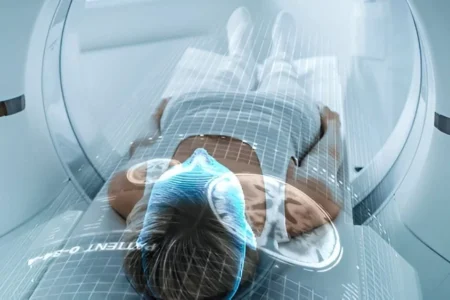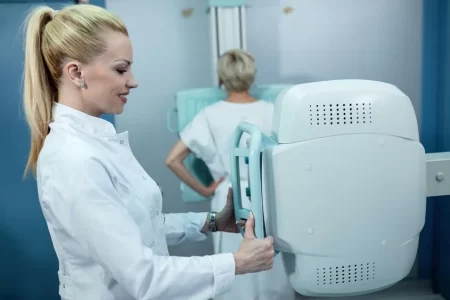Breast Cancer Genetic Testing
- Updated on: Jul 24, 2024
- 4 min Read
- Published on Aug 13, 2018

Genetic testing for breast cancer
There are many factors that contribute to the increasing risk of breast cancer in women. The most important of them is inherited genes. Genetic testing is used to analyze whether or not breast cancer has occurred due to family history i.e. due to an inherited gene mutation. It was found in a study that, in most cases, breast cancer in women does not occur due to an inherited gene mutation.
About 10 to 12% cases of breast cancer are found to be hereditary i.e. they occur due to gene mutations passed on from one or both parents. In the U.S., about 7% of breast cancer cases are associated with inherited gene mutations and about 50% of these are associated to breast cancer genes 1 and 2 – BRCA1 or BRCA2 gene mutation.
Genetic testing defines alterations in a person’s genes. These alterations or changes lead to an increased risk of developing some cancers including breast cancer. Three most important genes that elevate the risk of breast and/or ovarian cancer are BRCA1, BRCA2, and PALB2.
People with inherited mutations in these genes have an increased risk of developing breast cancer and ovarian cancer (for women). Men with mutations in BRCA2 have an increased risk of male breast cancer, and sometimes prostate cancer.
See also: What Is Breast Cancer in Females?
See also: Early Signs and Symptoms of Breast Cancer
What are BRCA1 and BRCA2 genes?
BRCA1 and BRCA2 are human genes which produce tumor suppressor proteins that help to repair the damaged DNA. These genes ensure the stability of genetic material in each cell.
Mutations in BRCA 1 or 2 may lead to lack in production of protein due to which the damaged DNA is not repaired. This leads to additional genetic alteration resulting in breast cancer.
Sometimes inherited mutations in BRCA1 and BRCA2 increase the risk of female breast, ovarian and several other types of cancer. A child has about 50% chance of inheriting the mutation even if one parent is affected.
BRCA Testing
A BRCA test for breast cancer is used to determine the presence of an inherited gene mutation in women. BRCA testing for breast cancer is a genetic test that studies the sequence or code of BRCA1 and/or BRCA2 genes. Increased cancer risks are depicted through any changes or mutations in the sequences or genetic codes.
The BRCA gene testing is performed on a blood or saliva sample. DNA analysis is possible through this test which helps in detecting any changes or mutations that can be harmful or can cause cancer. It takes about three weeks to get the results of BRCA test.
Results of BRCA1 and BRCA2 testing
If BRCA1 or BRCA2 are found to be positive, it indicates that genetic mutation might increase the risk of breast cancer in the patient. A ‘BRCA1 positive’ result in a woman gives an idea that there is about 70% probability of lifetime risk of breast cancer. When BRCA2 gene positive is detected, there is about 60% probability of getting breast cancer.
BRCA gene positive test also detects an increase in the risk of several types of cancers in addition to the breast and ovarian cancer such as fallopian tube cancer and peritoneal cancer. Men with BRCA2 positive mutations also indicate an increased risk of breast cancer and prostate cancer. In some cases, both men and women with BRCA2 and BRCA1 positive results of mutations indicate an elevated risk of pancreatic cancer. Also, in some cases, women who inherit a BRCA1 gene mutation or BRCA2 gene mutation may never develop breast or ovarian cancer.
When a BRCA negative result is obtained, it indicates that breast cancer gene mutation was not identified. If BRCA mutation testing is found to be negative, the results should be interpreted cautiously to avoid any risk as there might be chances of increased risk for breast cancer due to potential mutations in other genes other than BRCA genes. Researchers suggest that there is a possibility of a “negative” test result to have a harmful unidentified BRCA1 or BRCA2 mutation.
Gene testing results are not always clear i.e. they can sometimes be uncertain or ambiguous. Uncertain or ambiguous test results indicate that some types of mutations are found on the genes but their chances of developing into breast cancer are not clear. Re-testing is often recommended in such cases to detect cancer at the early stage and for preventing its growth.
BRCA testing guidelines should be considered during the gene test. It is preferred that patients at risk consult genetic counselors and other health care providers to determine potential risks, limitations and benefits of undergoing genetic testing. It also helps to explore the family history of cancer associated-BRCA positive person and other related factors such as ethnicity.
More: Breast Cancer Diagnosis and Early Detection
More: Diet for Breast Cancer Patients
What does genetic testing cost?
BRCA mutation testing or breast cancer genetic testing can be quite expensive, depending on the nature and complexity of the test. The cost tends to increase when multiple tests are conducted or several family members are tested for a result. In many cases, insurance companies also cover the cost of genetic testing.
Cost for BRCA tests ranges from $200 to about $5,000 depending upon the type of BRCA test. Some commercial labs usually provide results within 2 to 4 weeks whereas research centers take a longer duration of about a minimum of 4 weeks.
Pros and cons of genetic testing
Some advantages of genetic testing include:
- A sense of relief from uncertainty and early detection can lead to better treatment
- Deep knowledge about self health condition
- Chances for improved medical and lifestyle decisions
- Chance to assist and educate other family members about potential risk through self experience
- Appropriated reasons for a delay in physical, mental, and emotional growth can be determined and improved
A few disadvantages of genetic testing:
- Test results might increase anxiety and stress by increasing the emotional and psychological stress in some cases
- Some tests can be really destructive to the health
- Some tests are very specific and not competent enough to determine severity of the manifestation of the disease.
In some cases, results may be uncertain because millions of genetic mutations are still not studied.












